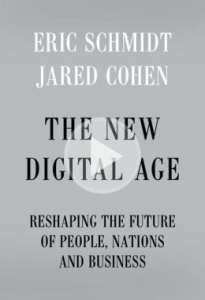 If you are looking for an alternative, or an addition, to the light summer beach read, it would be worth taking a look at The New Digital Age – Reshaping the Future of People, Nations and Business by two top Google execs, Eric Schmidt, the company’s Chairman and Jared Cohen, the Director of Googe Ideas. This is an in-depth study, or prediction, of how the Internet will transform life as we know it in the coming decades. Schmidt and Cohen are qualified experts in giving us a glimpse into the not-so-distant future, a tale that is both cautionary and captivating.
If you are looking for an alternative, or an addition, to the light summer beach read, it would be worth taking a look at The New Digital Age – Reshaping the Future of People, Nations and Business by two top Google execs, Eric Schmidt, the company’s Chairman and Jared Cohen, the Director of Googe Ideas. This is an in-depth study, or prediction, of how the Internet will transform life as we know it in the coming decades. Schmidt and Cohen are qualified experts in giving us a glimpse into the not-so-distant future, a tale that is both cautionary and captivating.
The implications of a world, where everyone will soon be connected, is both mind-boggling and a bit frightening. To the authors, however, conectivity is the key to improving impoverished lives, enhancing education and deterring the stifling of freedom in autocratic countries. The primary theme of the book is that the virtual world can make the physical world better. The authors provide many detailed examples for their predictions, based on their travels, research and experience. Many of the chapters are devoted to the Internet’s future impact on governments and developing nations, which can be overwhelming but is complex and informative.
Virtual connectivity to all parts of the world may have seemed unlikely a few years ago, but the smartphone, especially inexpensive smartphones, will soon bring the Internet to the poorest and most remote spots on earth. Public wireless hotspots and high speed home networks will ensure this connectivity.
Much has been written about data and Big Data, because connectivity also brings the ability to collect and use data. This use of data offers many possibilities in business, government and medicine. The Cloud will continue to grow and be the source of data storage, offering more features and possibilities. The authors stress that Cloud computing reinforces the permanence of data and adds another layer of remote protection for users and their information.
The book also looks at identity as the most valuable commodity of individuals in the future and that it will exist primarily online. Many more businesses will be born out of the concerns for individual and organizational privacy, catering to reputation concerns. The authors emphasize that security and privacy should be a combined concern and responsibility of companies, users and institutions. Online security and the use of the Cloud will continue to grow and become central to life in the future. This book is a fascinating look into the future and it is correct in its assumption that the mass adoption of the Internet is driving one of the most social, cultural and political transformations in history. So, curl up into a good beach chair and get ready for a thought-provoking read.


